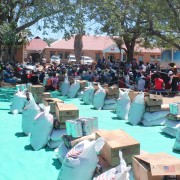
The U.S. Government, through the U.S. Agency for International Development (USAID), provided humanitarian assistance for over 2 million Zimbabweans during the El Niño-induced drought that led to widespread crop failure and left 4.1 million rural Zimbabweans food insecure. As the annual harvest approaches, USAID and its partners are reviewing the progress and achievements of a successful drought response and continuing ongoing activities that aim to improve long-term food security for Zimbabwe.
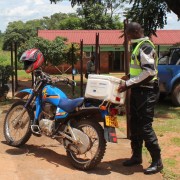
The United States Government stands with the people of Zimbabwe in commemorating World Tuberculosis (TB) Day on March 24. Through the U.S. Agency for International Development (USAID) and the U.S. Centers for Disease Control and Prevention (CDC), the United States has contributed long-term and substantial investments to the fight against TB in Zimbabwe, reaching hundreds of thousands of Zimbabweans with life-saving health services.
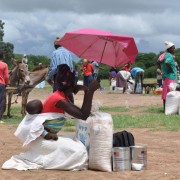
The United States Government has provided an additional US$4 million in response to drought affected areas in Zimbabwe, targeting people living with HIV in the most severely affected areas of the country. This funding brings the total U.S. support to alleviate the effects of drought to $131 million, assisting 2 million people since June 2015.
The United States and Zimbabwe celebrated the first anniversary of the DREAMS initiative at The Venue in Avondale, Harare today. DREAMS – which stands for Determined, Resilient, Empowered, AIDS-Free, Mentored, and Safe – is an ambitious two-year partnership to reduce new HIV infections among adolescent girls and young women by 40 percent in ten sub-Saharan countries, including Zimbabwe. Empowering adolescent girls and young women to protect their health and well-being is critical to achieving an AIDS-free generation.
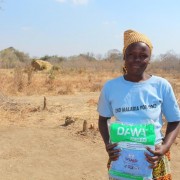
The United States Government and the Global Fund to Fight AIDS, Tuberculosis, and Malaria (Global Fund) supported distribution of 1,785,000 long-lasting insecticidal nets (LLINs) to communities at risk for malaria in August and September of this year. This effort, which is coordinated and led by the Ministry of Health and Child Care’s National Malaria Control Program (NMCP), was timed to precede the annual seasonal malaria transmission peaks witnessed during the rainy season.
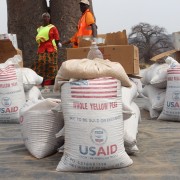
The U.S. Government and our partners welcome the Zimbabwe Human Rights Commission’s investigations into the distribution of food assistance along political party lines. As the largest contributor to humanitarian assistance in Zimbabwe, the United States Agency for International Development (USAID) has robust mechanisms in place to ensure that U.S. food assistance goes only to those most in need. While the report did not cite any complaints regarding USAID-funded humanitarian assistance, we are redoubling our efforts to reconfirm and ensure that our assistance is not subject to any form of political manipulation.
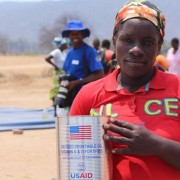
The United States Agency for International Development (USAID) is providing $127 million in new humanitarian assistance for Southern Africa in response to the drought affecting the region. Zimbabwe will receive $54.5 million, representing 42.5 per cent, of the new funding. The remainder will be distributed to Malawi, Mozambique, Madagascar, Lesotho, and Swaziland. This new humanitarian funding to Southern Africa is consistent with the Southern Africa Development Community (SADC)'s regional appeal launched by President Khama in Botswana on July 26.
In response to growing food insecurity in Zimbabwe, the United States Agency for International Development (USAID) announced today $20 million in additional funding to the United Nations World Food Programme (WFP). This contribution brings the total U.S. funding for drought relief since June 2015 to $55 million.
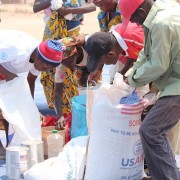
In response to worsening drought conditions and increased food insecurity, the United States Agency for International Development (USAID) has announced an additional $5 million contribution to the United Nations World Food Programme (WFP) for humanitarian assistance to Zimbabwe. This brings the total amount of U.S. Government funding for humanitarian assistance to Zimbabwe to $32.5 million since June 2015 following a poor harvest across the country.








Comment
Make a general inquiry or suggest an improvement.